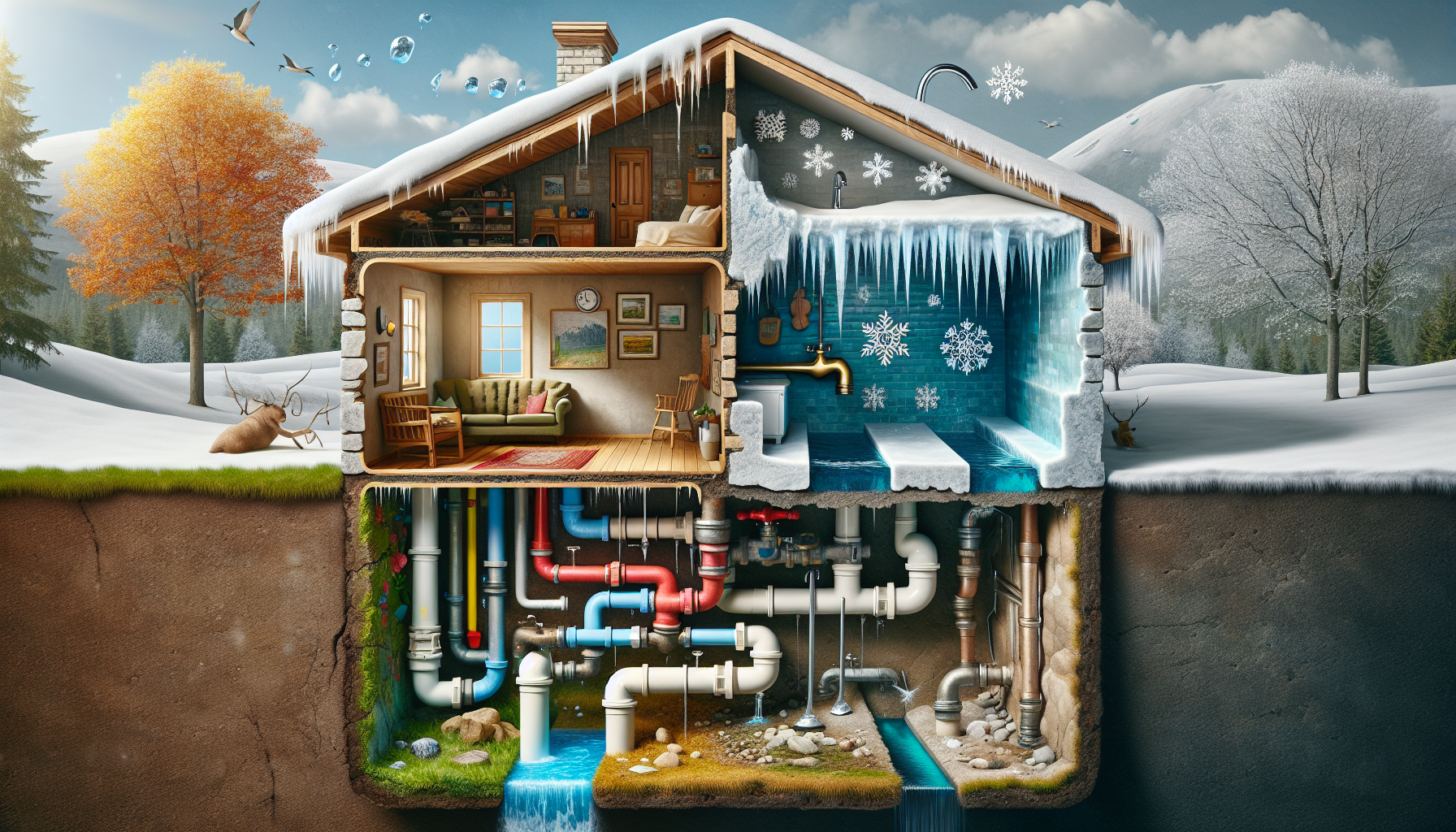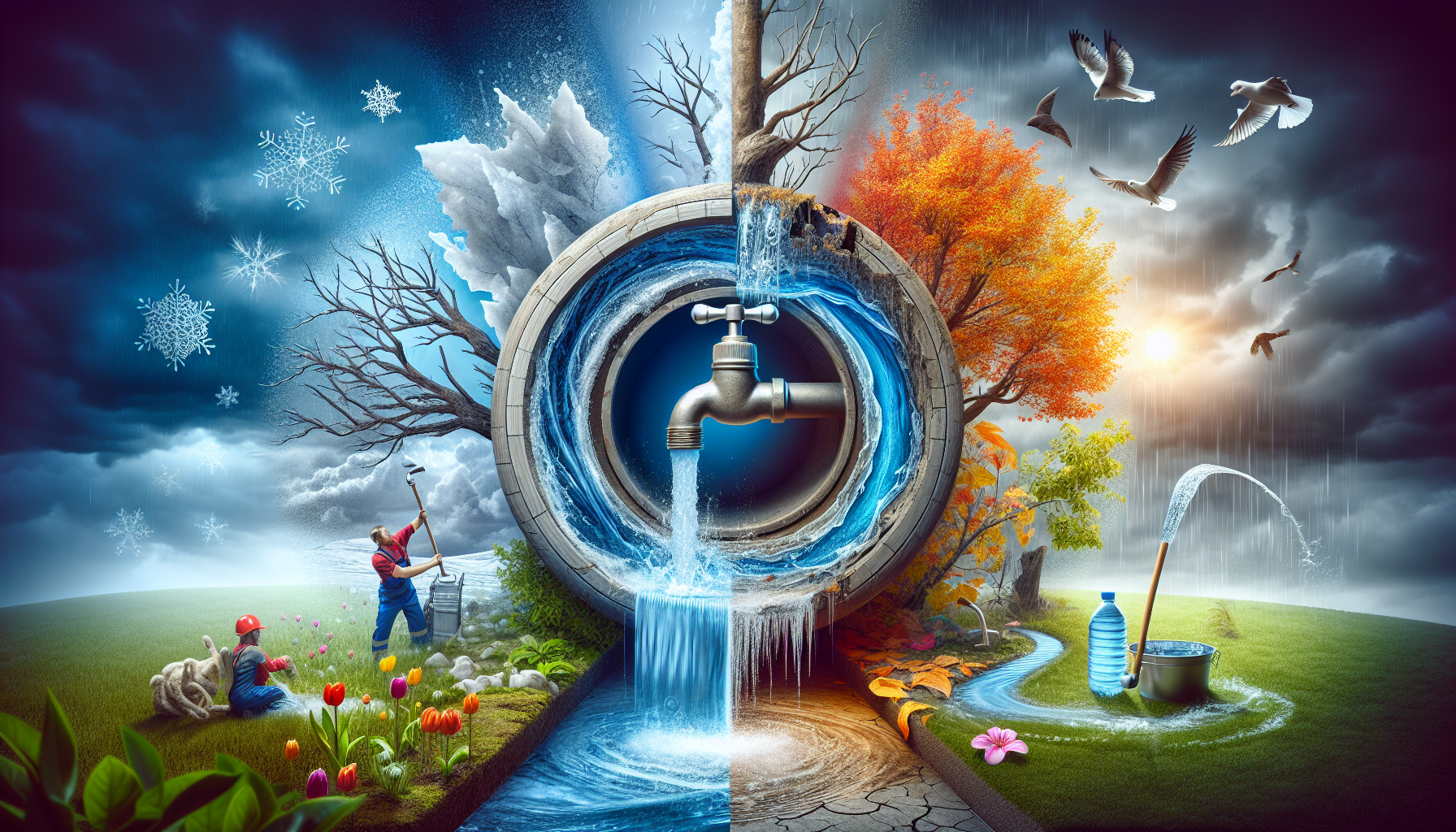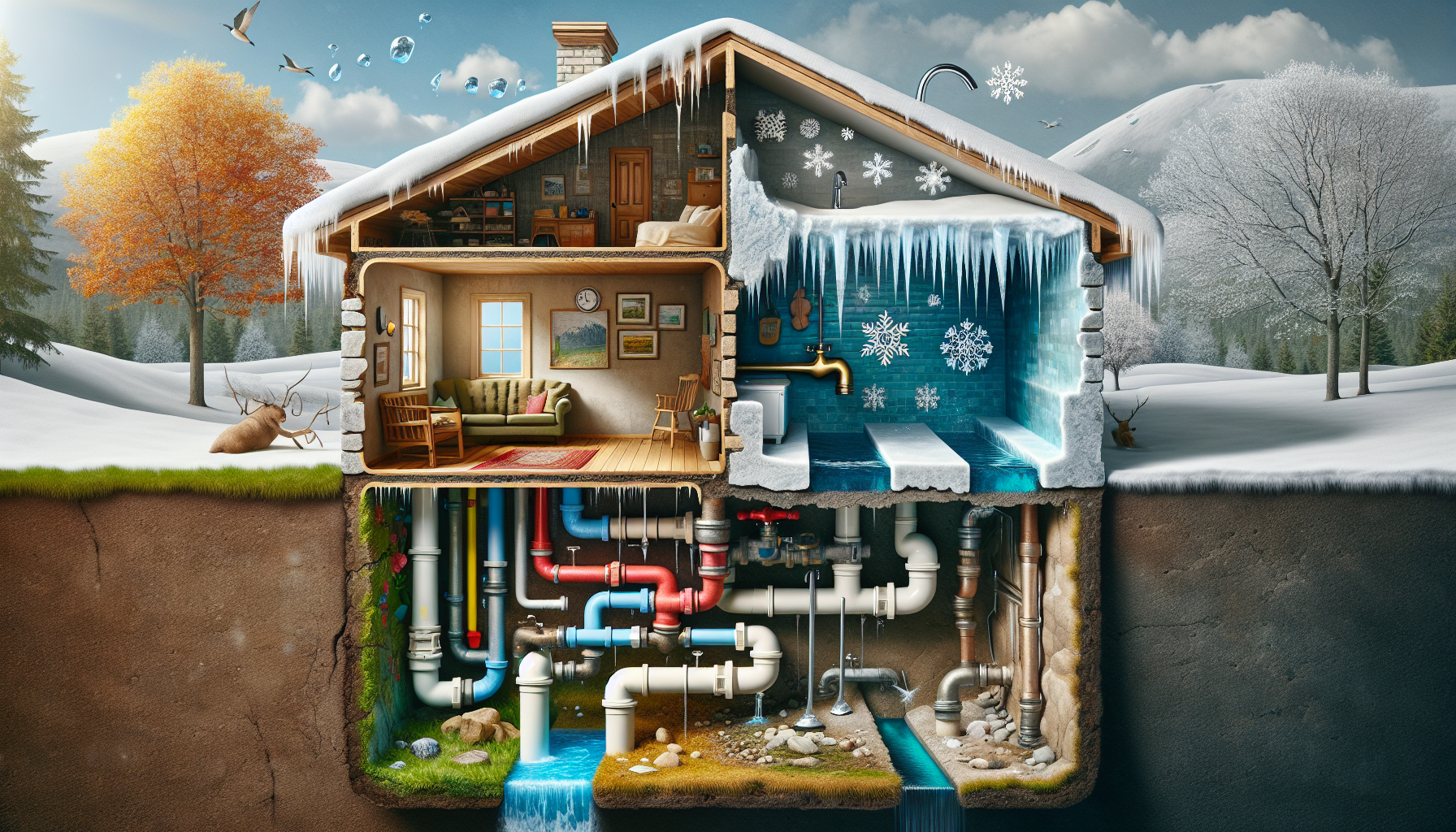As the seasons change, so does the impact on your plumbing system. From freezing temperatures in winter to sweltering heat in summer, these seasonal shifts can wreak havoc on your pipes and drains. From burst pipes to clogged drains, the effects can be both inconvenient and costly. In this article, we will explore how seasonal changes can impact your plumbing system and provide valuable tips on how to prevent and address these issues. So, whether you’re battling the chill of winter or the scorching temperatures of summer, read on to learn how to keep your plumbing system in top shape all year round.
Extreme Temperatures
Freezing Temperatures
Freezing temperatures can have a significant impact on plumbing systems. When the temperature drops below freezing, the water in your pipes can freeze, leading to a host of problems. As water freezes, it expands, causing the pipes to crack or even burst. This can result in costly repairs and water damage to your home. Additionally, frozen pipes can cause a complete blockage, preventing water from flowing through your plumbing system.
Hot Summer Temperatures
While freezing temperatures pose a threat to plumbing systems, hot summer temperatures can also have adverse effects. High temperatures can cause the pipes to expand, potentially leading to leaks or pipe bursts. Additionally, extreme heat can increase water pressure, putting stress on your plumbing fixtures and causing them to fail. It is essential to be aware of the impact that hot summer temperatures can have on your plumbing system to prevent any issues from arising.
Frozen Pipes
Causes of Frozen Pipes
Frozen pipes occur when the temperature drops below freezing, causing the water inside the pipes to freeze. There are several factors that contribute to the freezing of pipes, including inadequate insulation, exposure to cold air, and pipes located in unheated areas of your home. Lack of proper maintenance and leaving outdoor faucets connected during the winter are also common causes of frozen pipes.
Effects of Frozen Pipes
When pipes freeze, they can crack or burst due to the expansion of the water inside them. This can result in significant water damage to your home and require expensive repairs. Frozen pipes can also cause a complete blockage, preventing water from flowing through your plumbing system. This can lead to inconvenience and a disruption of daily activities until the pipes are thawed.
Preventing Frozen Pipes
To prevent frozen pipes, it is important to take proactive measures. Start by insulating exposed pipes with foam or pipe sleeves. Pay special attention to pipes in unheated areas such as basements, crawl spaces, and attics. Disconnect and drain garden hoses before winter and consider installing frost-proof faucets. It is also crucial to keep the temperature inside your home at a consistent level, even when you are away. Opening cabinet doors under sinks can allow warm air to circulate around the pipes, helping to keep them from freezing.

Burst Pipes
Causes of Burst Pipes
Burst pipes can occur for various reasons, and they are often a direct result of frozen pipes. When water inside a pipe freezes and expands, it can put immense pressure on the pipe walls, causing them to burst. However, burst pipes can also be caused by other factors such as age, corrosion, high water pressure, or tree root intrusions. It is important to address these potential causes to prevent burst pipes from happening.
Signs of Burst Pipes
Detecting burst pipes can sometimes be challenging, especially if they are hidden behind walls or in the foundation. However, there are common signs that may indicate a burst pipe, such as a sudden drop in water pressure, water discoloration, wet spots or mold growth on walls or ceilings, unexplained increase in water bills, or an unusual sewage smell. If you notice any of these signs, it is crucial to act quickly to minimize further damage.
Consequences of Burst Pipes
The consequences of burst pipes can be extensive and costly. Water damage resulting from burst pipes can lead to structural issues, mold growth, and damage to personal belongings. Additionally, burst pipes can cause water wastage and increase your water bills significantly. If left untreated, burst pipes can result in long-term damage to your plumbing system and pose health risks due to water contamination.
Preventing Burst Pipes
To prevent burst pipes, it is important to address the potential causes. Proper insulation of pipes, especially in colder areas of your home, can help prevent freezing and subsequent bursts. Regular maintenance of your plumbing system, including checking for signs of corrosion or deterioration, can help identify at-risk pipes and address them in a timely manner. It is also advisable to monitor your water pressure and consider installing a pressure-reducing valve if it is excessively high. Lastly, professional tree root removal and periodic sewer line inspections can help prevent burst pipes caused by root intrusions.
Water Pressure
Low Water Pressure
Low water pressure can be a frustrating issue as it affects the functionality of your plumbing system. Several factors can cause low water pressure, including partially closed valves, mineral buildup in pipes, clogged aerators or showerheads, or leaks in the plumbing system. Identifying the cause of low water pressure is essential to address the issue effectively.
High Water Pressure
While low water pressure can be problematic, high water pressure can also have adverse effects on your plumbing system. Excessive water pressure can strain pipes, fixtures, and appliances, potentially leading to leaks or bursts. It can also cause noisy pipes, known as water hammer, and increase the risk of damage to your plumbing system. Monitoring and maintaining the appropriate water pressure is crucial for the longevity and functionality of your plumbing.
Effects on Plumbing Systems
Both low and high water pressure can impact your plumbing system in various ways. Low water pressure can result in reduced water flow, making tasks such as showering or washing dishes cumbersome. It can also affect the efficiency of appliances that require a steady water supply. High water pressure, on the other hand, can cause issues such as leaks, bursts, or premature wear and tear of plumbing fixtures. It is important to ensure the optimal water pressure to avoid these potential problems.

Water Heater Performance
Winter Impact on Water Heaters
Winter can have a significant impact on the performance of water heaters. Cold incoming water temperatures can make it harder for water heaters to reach and maintain the desired temperature. This can lead to longer heating times, reduced hot water supply, and increased energy consumption. Additionally, freezing temperatures can pose a risk to water heaters located in unheated areas, potentially causing damage or leaks.
Summer Impact on Water Heaters
While winter can be challenging for water heaters, summer also brings its own set of issues. High ambient temperatures can cause the water heater to work harder to maintain the desired temperature, leading to increased energy consumption. Additionally, if your water heater is in a hot environment, such as a poorly ventilated utility room, it can overheat, potentially resulting in malfunctions or safety hazards.
Maintenance Tips
To ensure optimal water heater performance throughout the year, regular maintenance is key. Start by draining and flushing the tank annually to remove sediment buildup that can affect efficiency. Insulating the water heater and hot water pipes can help minimize heat loss, especially during winter. Checking the temperature and pressure relief valve is also important to ensure proper functioning and safety. It is advisable to consult a professional plumber for more specific maintenance tips based on the type of water heater you have.
Sewer System
Sewer Line Blockages
Sewer line blockages can cause significant damage and inconvenience. Blockages can occur due to a buildup of items such as hair, grease, or foreign objects, leading to clogs in your plumbing system. The consequences of sewer line blockages can include sewage backups, slow draining sinks or toilets, foul odors, or even sewer line collapses. It is crucial to address blockages promptly to prevent further damage and health hazards.
Tree Root Intrusions
Tree roots seeking water and nutrients can infiltrate aging sewer pipes. As the roots grow, they can cause blockages, cracks, or even collapse of the sewer lines. Signs of tree root intrusions can include slow drainage, gurgling sounds in the plumbing system, or foul odors. Regular sewer line inspections and proactive measures such as planting trees away from sewer lines or installing root barriers can help prevent tree root intrusions.
Seasonal Sewer Odors
Seasonal changes can exacerbate sewer odors, making them more noticeable during certain times of the year. Higher temperatures in summer can increase bacterial activity in the sewer system, leading to stronger odors. Additionally, during heavy rainfalls or spring thaws, sewer lines can become overwhelmed, causing sewage backups and unpleasant odors. Proper maintenance of the sewer system, including regular cleaning and inspections, can help minimize seasonal sewer odors.
Preventing Sewer System Issues
To prevent sewer system issues, it is important to practice proper maintenance and take preventive measures. Avoid flushing non-biodegradable items or excessive amounts of toilet paper down the toilet. Be mindful of what goes down the drains and use drain screens to catch hair or debris. Regularly clean and inspect your plumbing system, including sewer lines, to identify any potential issues before they become significant problems. It is also advisable to consult a professional plumber for periodic maintenance and inspections.
Septic Tank
Winter Challenges for Septic Tanks
Winter poses unique challenges for septic tanks. Cold temperatures can cause the ground to freeze, making it harder for effluent to drain properly from the tank into the leach field. This can lead to backups, odors, or even septic tank failures. Additionally, heavy precipitation during winter can overload the septic system, causing it to function less efficiently. Taking precautions during winter is essential to maintain the functionality of your septic tank.
Summer Challenges for Septic Tanks
While winter can be challenging, summer also presents specific challenges for septic tanks. Increased water usage during summer, such as from outdoor activities like watering the garden or filling pools, can put a strain on the septic system. This can impede the natural breakdown of solids and lead to clogs or backups. Managing water usage and being mindful of what enters the septic system can help prevent issues during the summer months.
Maintenance and Prevention
Regular maintenance of septic tanks is crucial for their proper functioning. This includes periodic pumping to remove accumulated solids and prevent overloading of the system. Using septic-friendly products and avoiding excessive use of harsh chemicals helps preserve the balance of beneficial bacteria in the tank. It is advisable to follow best practices for water usage, such as spreading out laundry loads throughout the week and avoiding excessive water consumption. Consulting a professional for septic tank inspections and maintenance can ensure the longevity and optimal performance of your septic system.
Backflow Prevention
Understanding Backflow
Backflow occurs when there is a reverse flow of water from a contaminated source into the clean water supply. This can happen due to a drop in water pressure or a back siphonage event. Backflow can result in the contamination of the potable water supply, posing a significant health risk. Understanding backflow and its potential causes is essential to implement effective prevention measures.
Seasonal Backflow Risks
Seasonal changes can increase the risk of backflow events. During the summer, high water demand can cause a drop in water pressure, potentially leading to backflow. Heavy rainfalls or flooding can also contaminate water sources and contribute to backflow issues. Understanding the specific seasonal risks in your area and taking appropriate preventive measures is crucial to protect your clean water supply.
Preventing Backflow
Preventing backflow requires the installation of backflow prevention devices and regular maintenance. These devices, such as backflow preventers or air gaps, are designed to prevent the reverse flow of water. They act as barriers between the contaminated source and the clean water supply, ensuring that water flows in one direction only. Regular inspection, testing, and certification of backflow prevention devices are necessary to ensure their effectiveness. Consulting a professional plumber or local water authority can help determine the appropriate backflow prevention measures for your specific situation.
Outdoor Plumbing
Garden Hoses and Sprinkler Systems
Outdoor plumbing, such as garden hoses and sprinkler systems, requires special attention during seasonal changes. Freezing temperatures during winter can cause water in garden hoses or sprinkler systems to freeze, leading to damage or even bursts. Disconnecting and draining garden hoses before winter can help prevent freezing and prolong their lifespan. Sprinkler systems should also be winterized by blowing out the water from the lines using compressed air.
Protecting Outdoor Faucets
Outdoor faucets are susceptible to freezing during winter, leading to potentially costly repairs. Protecting outdoor faucets with insulated covers can help prevent freezing and damage. Additionally, ensuring that any nearby pipes supplying outdoor faucets are properly insulated can further safeguard against freezing issues. Taking proactive measures to protect outdoor faucets can prevent inconvenient plumbing problems and save you time and money.
Drainage Issues in Different Seasons
Seasonal changes can also affect outdoor drainage. Heavy rainfalls during spring or summer can overwhelm drainage systems, causing flooding or pooling of water in your yard. It is important to ensure that gutters, downspouts, and other drainage components are clear of debris and functioning properly. Regular maintenance and cleaning of outdoor drainage systems can help prevent water damage to your property and ensure efficient water flow.
Water Conservation
Conserving Water in Dry Seasons
Water conservation is crucial, particularly during dry seasons when water supplies may be limited. Implementing water-saving practices, such as using low-flow fixtures, repairing leaks promptly, and practicing responsible outdoor water usage, can help conserve water. Consider installing rainwater harvesting systems to collect and reuse rainwater for tasks like watering plants or washing vehicles. Conserving water not only helps the environment but also reduces water bills and ensures a sustainable water supply.
Preventing Water Waste in Cold Seasons
In cold seasons, preventing water waste is essential to conserve resources and prevent potentially costly issues. Proper insulation of hot water pipes helps minimize heat loss, reducing the need to run water for extended periods to achieve hot water. Fixing leaks promptly, including dripping faucets or running toilets, prevents unnecessary water waste. Conserving water during cold seasons not only helps the environment but also promotes efficient water usage and reduces utility expenses.
In conclusion, seasonal changes can have a significant impact on plumbing systems. Understanding the potential effects of extreme temperatures, preventing frozen or burst pipes, maintaining appropriate water pressure, and addressing specific challenges to water heaters, sewer systems, septic tanks, backflow prevention, outdoor plumbing, and water conservation are vital for the optimal functioning and longevity of your plumbing system. By taking proactive measures, seeking professional assistance when needed, and implementing preventive maintenance, you can ensure the reliability and efficiency of your plumbing system throughout the year.

